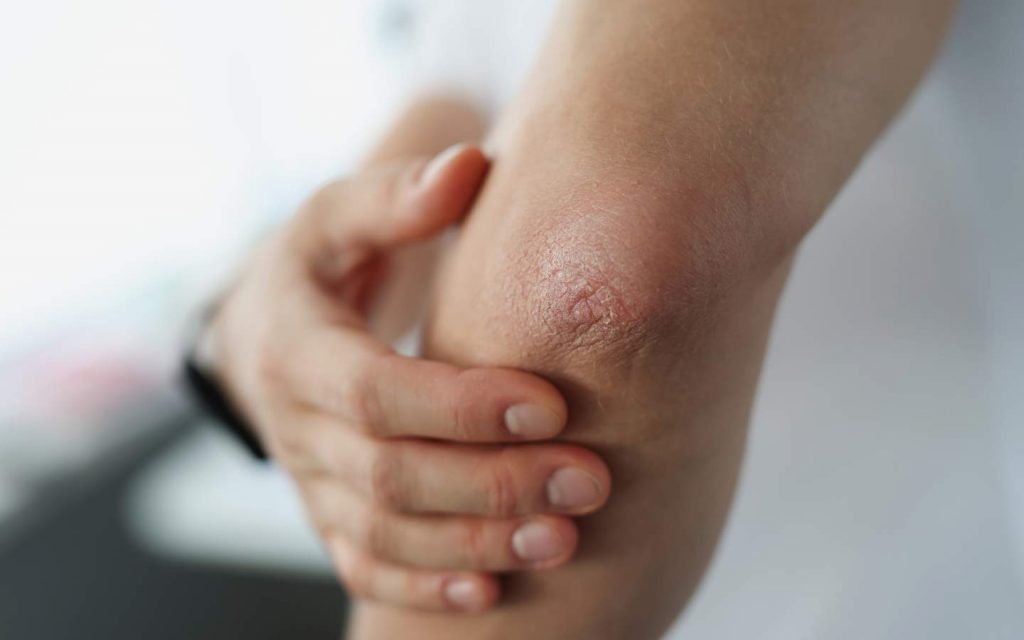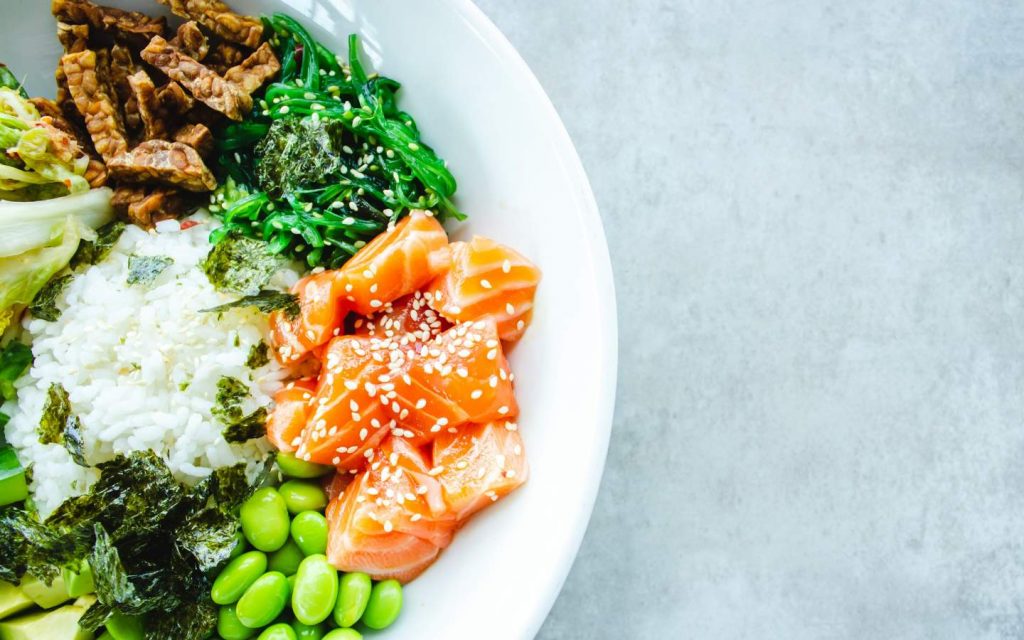
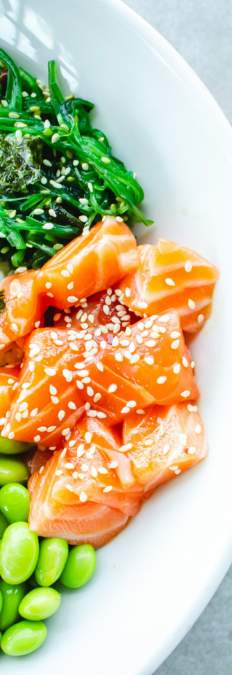
With dry skin, the sebaceous glands do not produce enough sebum to keep the skin firm and supple. This can be caused by many factors, such as genetic predisposition, hormonal influences or exogenous influences such as dry heating air. To counteract dry skin and restore a healthy moisture balance, you can support your body with a balanced diet. In the following article, you can find out more about nutrients and foods that help your skin stay beautiful and healthy. If you would like to find out more about other topics relating to dry skin, please click here.
Important nutrients for dry skin
As our largest organ, our skin can reflect the problems inside our body to the outside world. Even if a skin condition does not have its origins in our diet, it is important to maintain a healthy diet to combat it effectively.
We have already introduced you to nutrients that have a positive effect on the skin here. With regard to dry skin in particular, it is important to supply the body with valuable nutrients and vitamins so that our skin can regenerate better and retain moisture more effectively.
Vitamin A is involved in the formation of new skin cells and makes the skin more elastic by supporting the retention of moisture. The precursor of vitamin A is called beta-carotene. Beta-carotene is an antioxidant that protects the skin from free radicals and thus prevents premature skin ageing.
The B vitamins provide the skin with moisture and ensure smoother skin. Pantothenic acid and biotin are particularly important here. Pantothenic acid helps to build up and break down fats and supply our cells with energy. Biotin, on the other hand, helps to combat flaky skin by improving skin regeneration.
Vitamin C plays an important role in the body’s collagen production, helps to regulate the skin’s moisture balance and strengthens the connective tissue. In combination with beta-carotene, vitamin C also promotes skin elasticity.
Vitamin E is not only an antioxidant, but also has a strong moisturizing and circulation-promoting effect. Vitamin E also helps to strengthen the connective tissue.
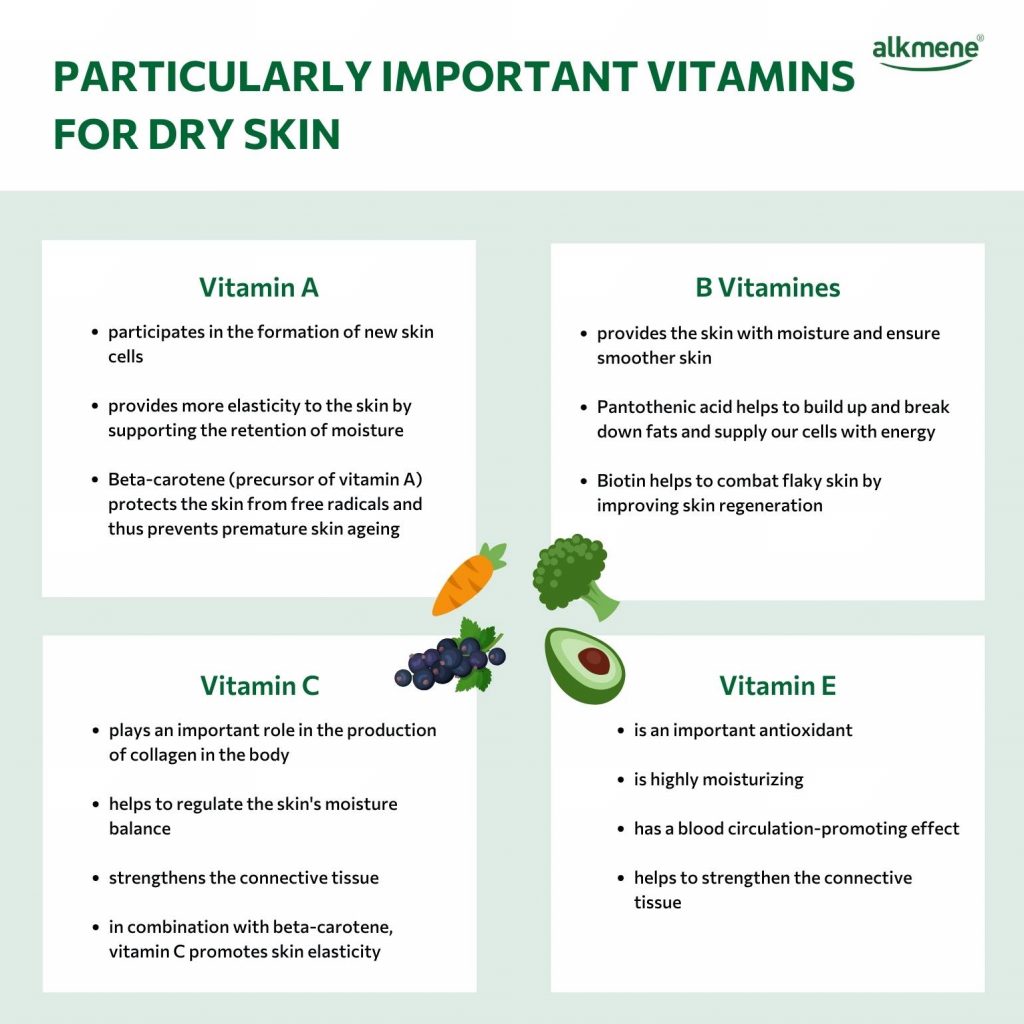
How minerals, proteins and fatty acids help with dry skin
- Minerals help to firm the skin. The intake of zinc in particular is essential to turn your dry skin into beautiful, healthy skin. This is because zinc helps with many processes: It supports collagen production, helps with inflammation and can contribute to a finer, soothed complexion.
- Protein is a protein that supports the development of connective tissue through amino acids and thus stabilizes the skin.
- Healthy fats are an essential part of a balanced diet. These fatty acids ensure that the skin remains supple and inflammation is alleviated.
Food for healthy skin
- Vitamin A: carrots, egg yolk, pumpkin, sweet potatoes, kale, peppers, mango, liver, spinach, peas
- Beta-carotene: carrots, peppers, broccoli, spinach, sea buckthorn, apricot
- B vitamins: Mushrooms, broccoli, dairy products, eggs, fish, meat, cereals, asparagus
- Biotin: carrots, tomatoes, oatmeal, mushrooms, milk, egg yolk, soybeans, tomatoes, bananas, nuts, spinach
- Vitamin E: sunflower seeds, nuts, fish, eggs, vegetable oils such as olive oil, avocado, kiwi, peas
- Vitamin C: contained in many types of fruit and vegetables, for example berries, citrus fruits, peppers, spinach, potatoes, strawberries
- Zinc: lentils, oatmeal, fish, meat, hard cheese, pumpkin seeds, rye bread, chickpeas, quinoa, offal, oysters
- Protein: Lean meat, fish, eggs, dairy products, wholegrain cereals, soy products, nuts, pulses
- Omega-3 fatty acids: Fatty fish such as salmon or mackerel, chia seeds, linseed, rapeseed oil, walnuts
Keep in mind when creating your nutrition plan
For a good diet for dry skin, you should consume fresh fruit and vegetables every day, as these are rich in vitamins and minerals and thus stimulate cell metabolism. If you find it difficult to put together a balanced diet, you can use the traffic light rule as a guide: Try to keep alternating between red, yellow and green fruit and vegetables.
Meat and fish are also part of a healthy diet, but should be eaten in moderation. When it comes to meat, lean meats such as beef and poultry are particularly suitable, as these help to build collagen and keep the skin moisturized. Fish should certainly be included in your diet if you have dry skin, as fish is particularly rich in omega-3 fatty acids and ensures stable and moisturized skin. Particularly rich fish are sea fish such as salmon or mackerel.
Although dairy products with nutrients such as protein can help with dry skin, it is advisable to use low-fat products such as low-fat quark or yoghurt to be on the safe side. If dairy products have a high fat content, they may contain a lot of arachidonic acid. Arachidonic acid can exacerbate the symptoms of skin prone to inflammation.
Foods to reduce if you have dry skin
Products such as white flour and sugar, which promote the breakdown of collagen, are particularly bad for dry skin. In addition to the breakdown of collagen, sugar also promotes inflammation in the body and therefore has two negative properties. Delicious sweets in particular contain a lot of sugar, but even healthy sweetener alternatives such as honey or date syrup should not be underestimated in terms of the amount of sugar they contain. It is not necessary to eat a completely sugar-free diet, but if you have dry skin or skin prone to inflammation, it makes sense to check your sugar intake and reduce it if necessary.
You should also avoid highly processed foods and fast food. Large amounts of preservatives can promote inflammation and the trans fats contained in fast food interfere with the skin’s blood circulation and moisture retention.
Of course, you should also avoid products that further remove moisture from the skin. These include alcohol, large amounts of salt and caffeine.
Anti-inflammatory diet
Many people who struggle with dry skin also suffer from eczema and inflammatory skin conditions such as atopic dermatitis, psoriasis or rosacea. Inflammation is an immune response of the body in response to external environmental factors and pollutants. Such an immune response is part of a healthy body. However, problems arise when these inflammatory processes go unnoticed in the long term or are unable to heal properly. Inflammation can become chronic and ultimately affect skin health. To counteract this, you can pay attention to anti-inflammatory foods in your diet.
4 tips for an anti-inflammatory diet
A high-fiber diet is highly recommended. It ensures that the good microbes in our gut are converted into anti-inflammatory fatty acids. Sources of fiber include whole grains, legumes, nuts, vegetables, mushrooms and cruciferous vegetables such as broccoli, kale and Brussels sprouts.
Antioxidants should also be included in this diet. When it comes to antioxidants, the secondary plant substances flavonoids, carotenoids and anthocyanins should be emphasized. You can find these in foods such as blueberries, raspberries, blackberries, cherries, oranges, lemons, grapefruit, red onions, tomatoes and red or yellow peppers.
Spices such as turmeric and ginger are part of traditional Chinese medicine for a reason. They have the ability to relieve inflammation and even prevent it.
Too much consumption of animal-based foods such as dairy products, sausage and meat is not good for intestinal health due to their high fat content. Inflammatory reactions are also promoted by refined products such as white bread, instant products and sweets.
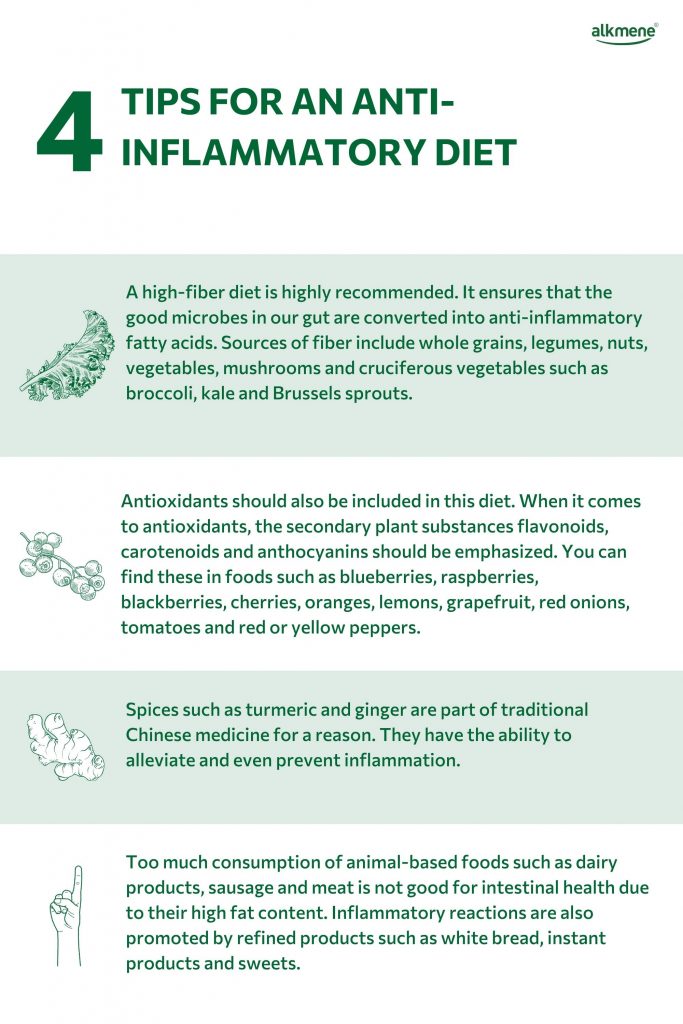
Disclaimer: For some skin problems, the problem lies in the diet, or more precisely, it is often due to allergenic ingredients such as lactose, gluten or fructose. It is therefore possible that skin problems or diseases are triggered by intolerances or allergies. In particular, if you suffer from gastrointestinal complaints at the same time as skin problems, we recommend that you consult a doctor.



